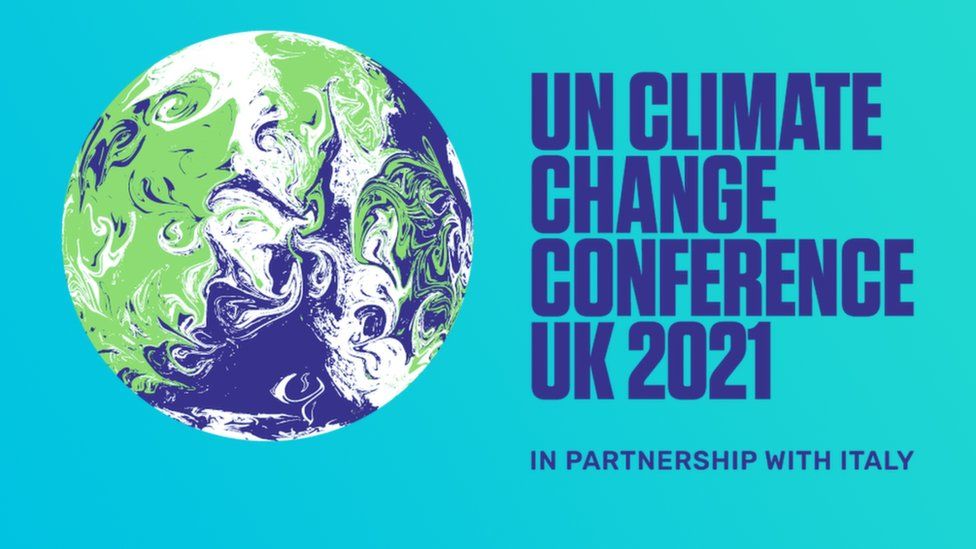COP26: What is it and why is it happening in Glasgow in 2021?
- Published
- comments

You may have heard that the UK is hosting a summit called COP26 which is seen as being really important if climate change is to be brought under control.
The COP26 event is a global United Nations summit about climate change and how countries are planning to tackle it.
It was due to take place in Glasgow in Scotland in November last year with more than 200 world leaders due to attend, but it was delayed for a year because of the coronavirus pandemic.
COP26 is now taking place in Glasgow between 31st October and 12th November 2021 and any decisions made could lead to big changes to our everyday lives.
So what is COP26 all about? Keep reading to find out.
Learn more about climate change here
What is COP26 and what does COP stand for?
COP stands for Conference of the Parties, and will be attended by countries that signed the United Nations Framework Convention on Climate Change (UNFCCC) - a treaty agreed in 1994.
The 2021 meeting will be the 26th meeting, which is why it's called COP26.
Why do we need COP?
The world is getting warmer because of fossil fuel emissions caused by humans.
Icecaps are melting and sea levels are rising.
We are seeing more extreme weather events taking place around the world - including heatwaves, floods and forest fires, these naturally occurring events are being made worse because of the effects of climate change.
The past decade was the warmest on record, and governments around the world agree that urgent action is needed.
Why is the planet getting warmer?
The warming of Earth happens because the atmosphere traps heat radiating from the world and stops it escaping into space.
Certain gases in the atmosphere, called greenhouse gases, block the heat from escaping. One of the biggest problems is carbon dioxide (CO2).
Carbon dioxide is released naturally but humans have increased CO2 in the atmosphere by more than a third by burning fossil fuels like coal and oil.
People in poorer developing countries tend to pollute less and are not responsible for most of the emissions in the past but they experience some of the worst effects of climate change.
They need money to help reduce their emissions and also to cope with climate change. For example, it could mean more solar panels in countries that depend on energy from coal and flood defence systems.
Did you know?
The world is now about 1.2C warmer than it was in the 19th Century - and the amount of carbon dioxide in the atmosphere has risen by 50%
The last conference, COP25, was held in Madrid, Spain, in November 2019 with Greta Thunberg giving a big speech at the event.
Watch: What Greta said to world leaders at COP25 in Madrid
The COP meeting in Madrid finished with lots of big issues unresolved, but an agreement was made about cutting carbon dioxide.
Each nation agreed to devise a plan to cut their carbon emissions by the next conference in Glasgow.
What is the Paris Agreement?
The Paris Agreement is a big international agreement to tackle climate change, which was agreed by leaders back in 2015 when 195 countries attended COP21 in Paris - hence the name.
However, there is still lots of debate about exactly how the agreed goals should be achieved.
What does the Paris Agreement say?
It says nations must:
• Reduce the amount of harmful greenhouse gasses produced and increase renewable types of energy like wind, solar and wave power
• Keep global temperature increase "well below" 2C (3.6F) and to try to limit it to 1.5C
• Review progress made on the agreement every five years
• Spend $100 billion dollars a year in climate finance to help poorer countries by 2020, with a commitment to further finance in the future.
What can we expect from COP26?
COP26 will be biggest summit the UK has ever hosted. It is being described as the most significant climate event since the 2015 Paris Agreement.
Presidents and prime ministers from around the world will be reporting back on progress since the Paris Agreement and, hopefully, there will be some new decisions on how to cut carbon emissions.
Some commitments made in Glasgow could directly affect our daily lives.
For example, environmentalists say big changes to how people live will be needed to hit climate targets, like people driving electric cars, moving away from gas heating, eating less red meat and not taking as many flights in the future.
What is the UK doing about climate change?
The UK government declared 2020 a "Year of Climate Action".
As well as the targets for changing to electric cars, the government has pledged to reduce the UK's carbon emissions to 'net zero' - which means cutting emissions drastically and absorbing as much carbon as it produces - by 2050.
This means emissions from areas like transport, farming and industry will have to be avoided completely or offset by sucking carbon dioxide out of the atmosphere.
This isn't technically Prime Minister Boris Johnson's idea - he inherited the pledge from the former prime minister Theresa May, who put the commitment into law in June 2019.
But Mr Johnson has said he wanted fighting climate change to be one of his government's biggest priorities and he has made a series of announcements around renewable energy, national parks and protecting the environment.
What would you like to see happen at COP26? Is your school planning any events around it? Let us know in the comments below..
If you cannot see the interactive activity on this page, click here.
- Published9 April 2021
- Published19 May 2020
- Published2 January 2020
